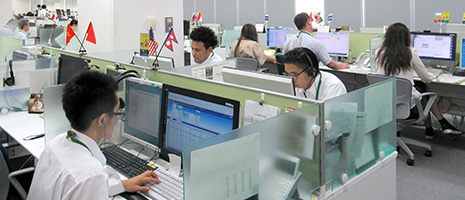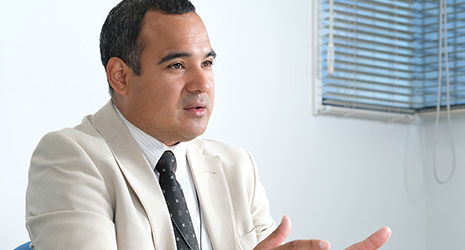Home > Highlighting JAPAN > Highlighting Japan June 2019 > Toward a Multicultural Symbiotic Society
Highlighting JAPAN


Removing Language Barriers
Peruvian Cesar Cabrejos is working to promote the availability of multilingual interpretation services in order for people of all nationalities to spend time in Japan with peace of mind.
With the number of foreign residents and foreign visitors increasing, it is not uncommon for foreigners who fall ill or are injured in Japan to seek medical attention at a Japanese hospital. The Ministry of Health, Labour and Welfare conducted a questionnaire of hospitals nationwide concerning their acceptance of foreign patients during the month of October 2018. Of the 3,980 hospitals that responded, 1,965 (49%) accepted foreign patients, including seven that accepted at least 1,000 patients. A high volume of emergency calls from foreigners are being received not only by hospitals but also by local fire departments, police authorities, and local governments, so it is important to create an environment that enables those calls to be interpreted quickly and accurately in multiple languages.
In response to this situation, Language One Corporation in Tokyo offers multilingual call center services that interpret three-way telephone calls. The company’s call center has around forty staff members, providing a 24-hour service in thirteen languages to respond to requests for interpreting from public institutions and private companies that have signed a contract with the company. In the case of medical interpretation, interpreting staff interpret conversations between patients and the doctors and nurses at some 200 medical facilities, over the telephone or using tablet devices. Each year, over 1,200 requests for medical interpretation services are received.
“There is no room for error in medical interpretation since human lives are at stake so, in principle, one person interprets and another supervises,” says Cesar Cabrejos of the company’s sales department.
A third generation Japanese from Peru, Cabrejos came to Japan with his parents in 1990 at the age of 11. He participated in the start-up of Language One in 2011 and became an interpreter for the company before taking on his current role working to promote the service.
In addition to hospitals, Language One’s contracted partners include fire departments, police authorities, bar associations, real estate companies, railroad corporations, and local governments. In 2012, the company launched its interpretation service for 119 calls requesting fire brigade and ambulance service in the event of emergencies such as fire or sudden illness in collaboration with Saitama City Fire Department, going on to expand the service nationwide. The Saitama City Fire Department set a precedent for the introduction of interpretation services for 119 calls in 298 of the total number of 728 local government fire departments nationwide.
The 119 calls demand a rapid response. Therefore a system has been established whereby when the company’s call center receives a request for an interpreter from a local government fire department, the call is immediately connected to a staff interpreter.
“I have seen for myself the work that staff do when they receive 119 calls at the Saitama City Fire Department. Witnessing them working so hard to save people’s lives was really moving and gave me a strong desire to go above and beyond,” says Cabrejos.
As well as interpreting, Cabrejos carries out promotional activities to let foreigners know that multilingual interpretation services are available. One such service is the multilingual service by the Japan Legal Support Center (JLSC) known as “Hoterasu.” JLSC is an organization that assists in the resolution of legal disputes, and anyone can access information on the legal system, consultation centers, and other services relating to both criminal and civil matters at no cost.
With a view to having foreigners make use of the service in times of emergency, Cabrejos and his co-workers visit embassies in Japan to advertise the service of JLSC and explain that it can be accessed by foreigners too.
Currently, Cabrejos is focusing on supporting foreigners during disasters. Until now, the company has provided a free interpreting service for inquiries from foreign victims during disasters such as the 2016 Kumamoto Earthquake and the 2018 Hokkaido Iburi Eastern Earthquake. In the future, he will work with local governments and NPOs to further disseminate services to support foreign disaster victims.
“I would like to help as many foreigners in need as possible. My mission is to act as an intermediary to enable foreigners to use Japan’s excellent public services,” says Cabrejos.
© 2009 Cabinet Office, Government of Japan






